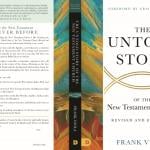Perhaps you thought I had forgotten about finishing the review of Tom’s Magnum Opus. You would be wrong. I just needed a break from wrestling with Leviathan. Perhaps you did as well. But this time we intend to haul in the rest of Moby Dick.
You may remember that we left things, at the end of May, with Tom’s discussion of eschatology and more specifically how Romans 2.1ff. fits into the larger scheme of things. We are picking things back up at p. 1086. Tom, it will be remembered thinks when Paul talks about a Gentile who has the law written on his heart, he is referring to Christians, not noble pagans. I think this dog won’t hunt, not least in light of Romans 7.14-25 where the person in question is: 1) not a Christian and 2) yet knows the law’s requirements of what he ought to do in his mind but just can’t do it.
Tom is also continuing his theme that the present judgment of God on sin, as spoken of in Rom. 1 is simply the future judgment brought back into the present. The problem with this analysis is not that there is not some connection between present and final judgment, but that final justification takes into account works in a way that present justification does not. Present justification is by grace through faith in Christ, end of story. As Rom. 2 makes more than clear, works figure into the equation at the eschaton, for both Gentiles and Jews, and indeed for both Christians and non-Christians. How precisely works fit into the final equation and final solution for Christians can be debated.
Tom is certainly right in following Cranfield where he says that if God did not react to our evil with judgment and justice, he might well be a merciful God but he would not be a good or a just or a righteous judge. Many today seem to be oblivious to this whole point. God is both holy, just and good, and at the same time loving, compassionate, and merciful. Not one or the other, but both. And the way that is possible in a world where all have sinned and fallen short is through the vicarious sacrifice of Christ. Furthermore, the theme of God repaying EVERYONE according to their works is a constant Biblical theme— including in the NT see 2 Cor. 5.10, 11.15l Mt. 16.27; 2 Tim. 4.14; 1 Pet. 1.17; Rev. 2.23; 18.6; 20.12f; 22.12. While final salvation is not on the basis of works (whether we are talking about present or future salvation), though works can affect the matter where apostasy is committed by a believer, rewards or the lack thereof are certainly based on works in this life. Equally, the stress in Romans 2 that God is impartial when it comes to judging works is a constant Biblical theme (2 Chron. 19.7; Sir. 35.14-15; Deut. 10.17; Job 34.19; Acts 10.34; Gal. 2.6; Ephes. 6.9; Col. 3.25; 1 Pet. 1.17). Many have confused God’s choosing of some person to be his witnesses, in this case Israel, with God somehow being partial to Israel when it comes to their deeds. This is not so— indeed, the OT is clear that judgment begins with the house of the Lord, and if anything God lives by the principle ‘to whom more is given, more is required’. Impartiality in the judgment of works is the issue in these texts. God does not overlook Israel’s sin, while thundering judgment down on pagans. To the contrary, when it comes to sin, God is an equal opportunity judger of all persons sins.
What exactly Paul means by faith is a fulfillment of the law, or even loving fulfills the law’s requirements will be discussed later (noting here that fulfillment is the language related to prophecy and promise, not related to the legal language of keeping, i.e. practicing all the Law). The question then becomes ‘which’ Law, Christians are expected to keep, and I would say the answer is the law of Christ, not the Mosaic law, and while there is overlap in content in these two laws, they differ as well, and are part of two different covenants. The new covenant doesn’t fulfill the Mosaic one, it eclipses it and goes beyond it. The mosaic covenant has been broken, and its curse sanctions exhausted in the death of Christ, and so it is finished, its just requirements for violations fulfilled in Christ’s death, which is what Rom. 10.4 means by calling Christ the end/terminus of the Mosaic Law.
Tom makes the important point that Paul’s discussion of judgment, like his eschatology in general, has of course been re-configured around his new beliefs about Christ and the Spirit (see pp. 1088-89). This is true— but the question is— in what way? Tom rightly stresses that part of this is that Jesus will come as the final judge of all things. Rom. 14.10-12 makes evident that present judgment and justification does not rule out or obviate the necessity for future judgment or justification. 2 Cor. 5.10 is explicit about the future judgment of Christian behavior (cf. 1 Cor. 4.5). And as Tom also rightly stresses, believers actually have a judging role to play at the final judgment, even when it comes to angels, apparently (1 Cor. 6.1-5). Tom sees this as reflecting the duality of Dan. 7 which speaks of ‘one’ like a Son of Man being the coming judge, but also of the holy ones of God being judges (see Dan. 7.18-27;Wis. Sol. 3.8; Sir. 4.15).
At p. 1091 we have Tom’s further attempt to read all of Romans 1-8, including the climax at the end of Romans 8, in light of Israel, and frankly it just doesn’t work. Romans 8 is not about God returning to dwell in the midst of Israel in or as the Temple. It is about all of creation sharing in the redemption to be experienced by believers at the eschaton. In other words, the story of creation is not shrunk down to the story of Israel, but is rather a more universal story, a story Paul deals with from Rom. 5.12ff right through Romans 8— the story of Adam and his kin and what will happened to them in the long run. What has misled Tom is the language of glory in Rom. 8. He takes this to refer to the Shekinah glory connected with Israel and Temple. While he is right of course that glory here does not refer to a believer being justified now and going to heaven (glory land) later, he is wrong that Paul does not envision the creation sharing in the glory that is yet to come. Glory for creation means its liberation from futility. Yes believers, will rule with Christ, and perhaps help in the liberation of creation at that point, but all of creation will reflect God’s glory in the end.
This section in Tom’s discussion is important as it reaffirms clearly his own commitment to and believe in future eschatology, which he summarizes as follows: “Paul’s hope was for nothing less than the redemption of all creation, and of humans within that. This would be the result of the divine ‘judgment’, exercised through the Messiah himself on his ‘day’ whose verdict is already known for those ‘in the Messiah’. (p. 1094). This includes death being defeated as the last enemy, by means of future resurrection. Here one needs to have read Resurrection and the Son of God, Tom’s earlier important work, as it is presupposed throughout all this discussion.

















